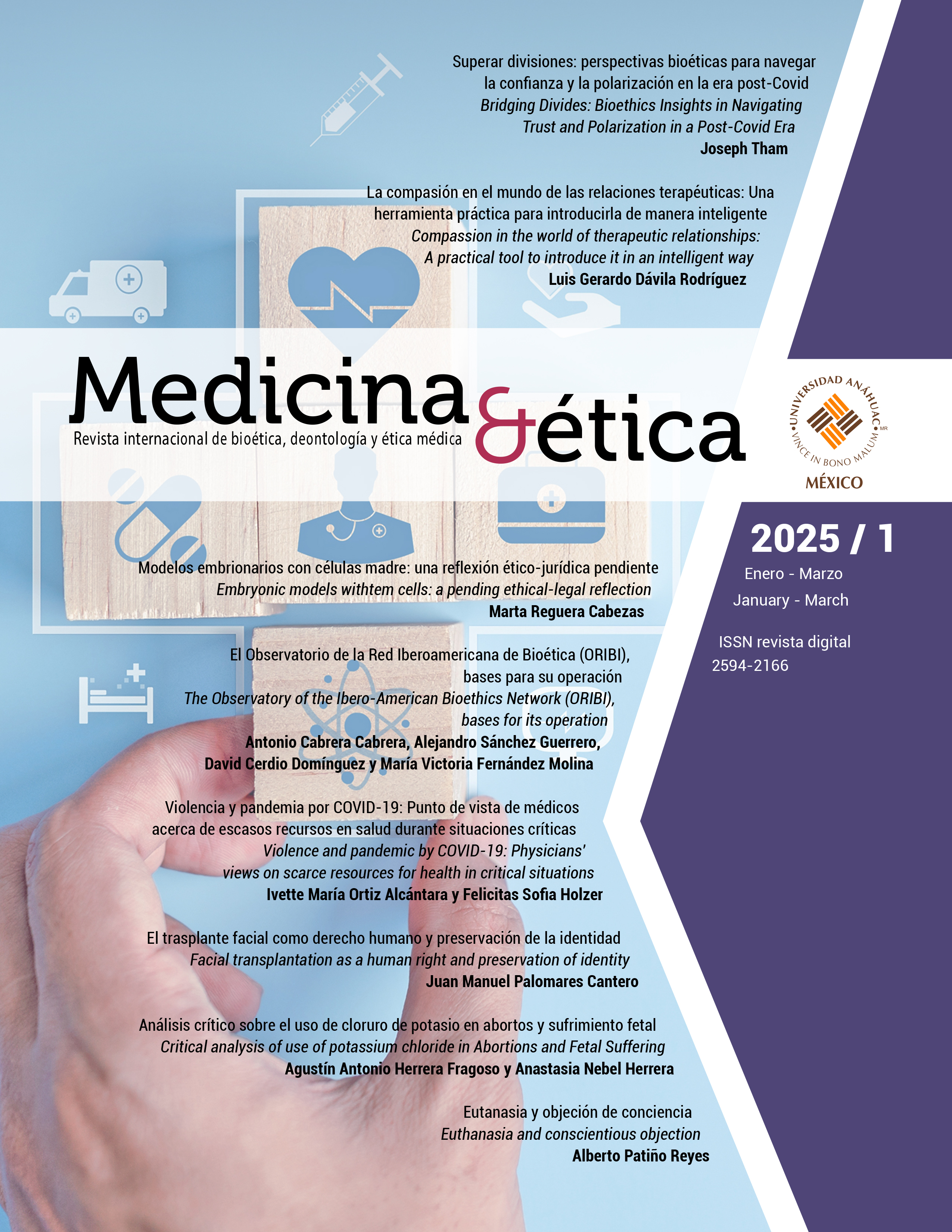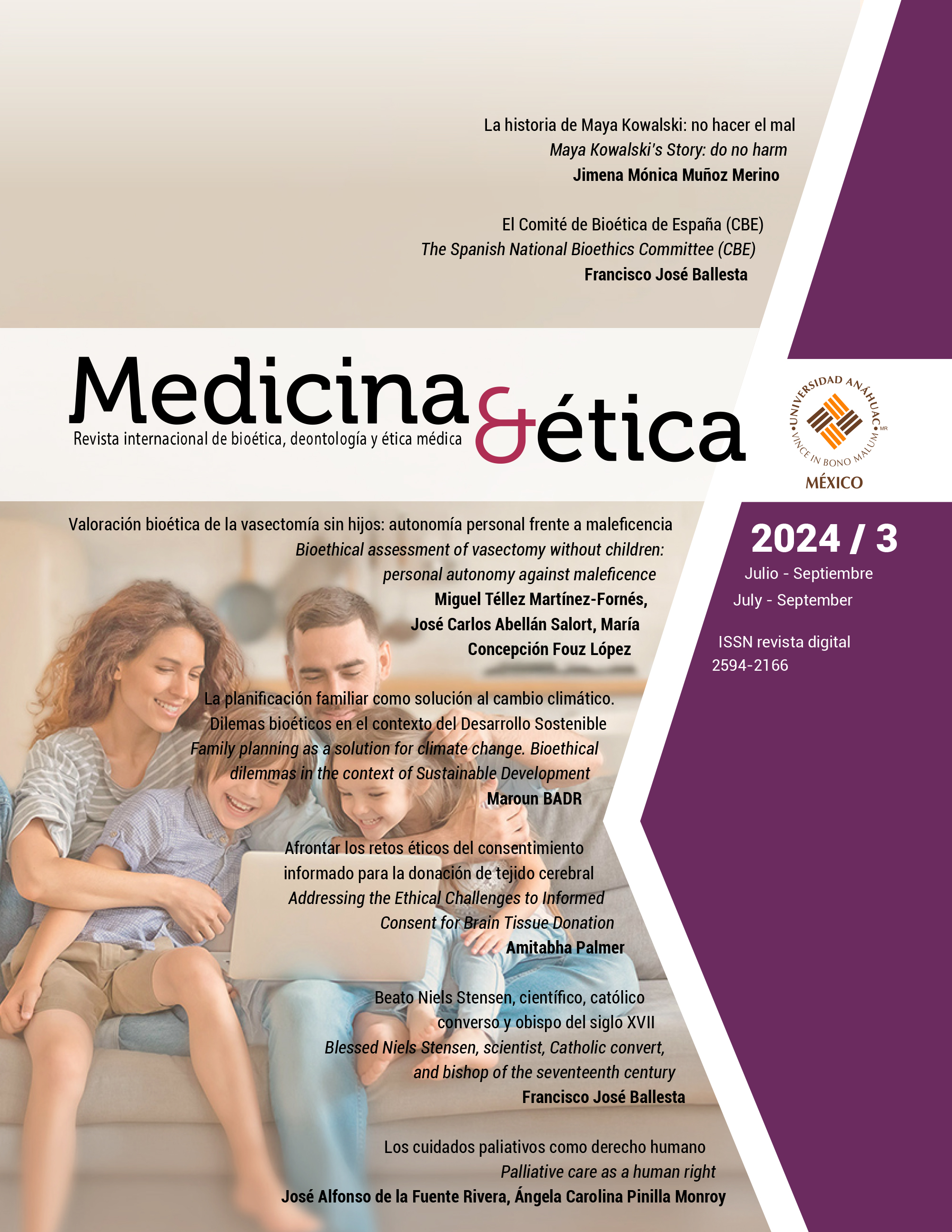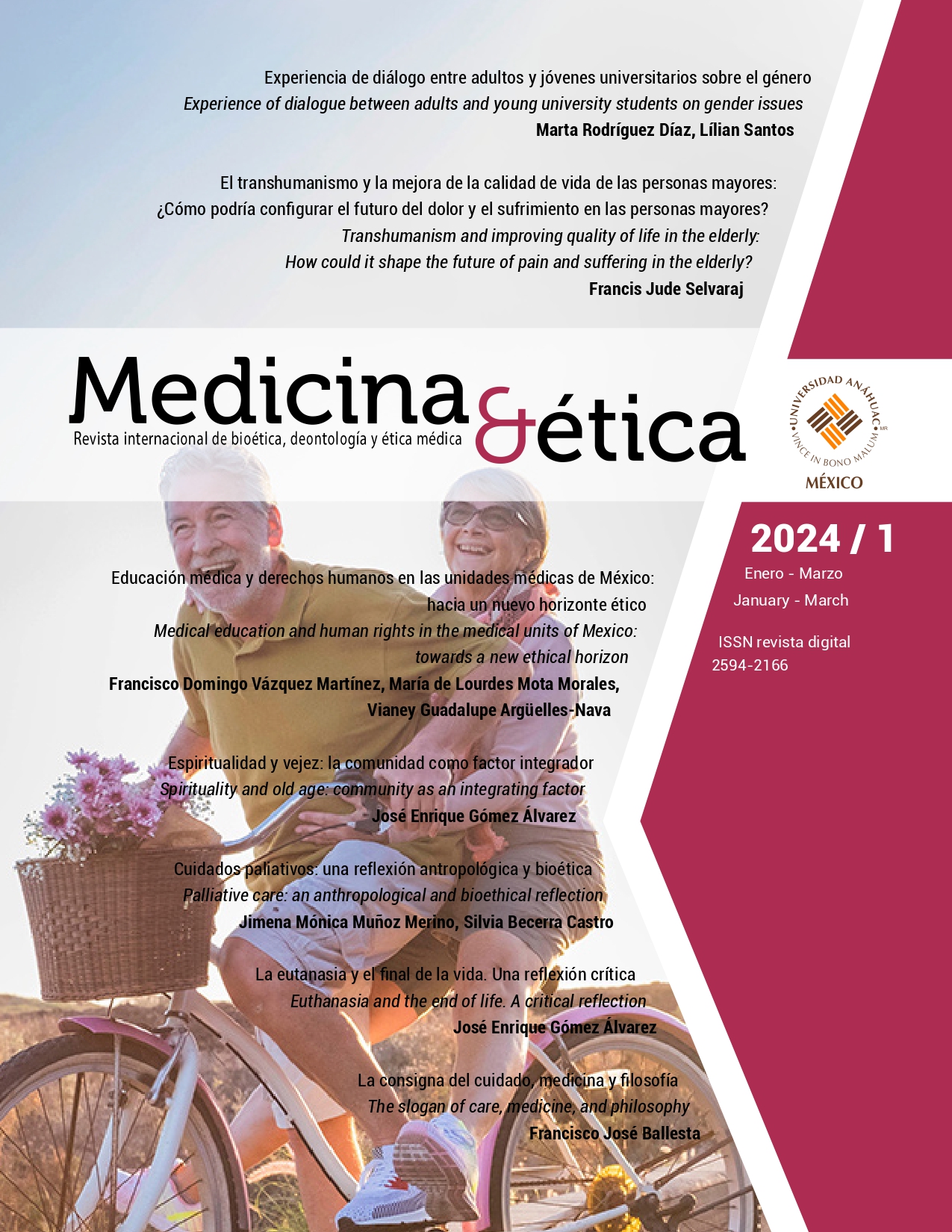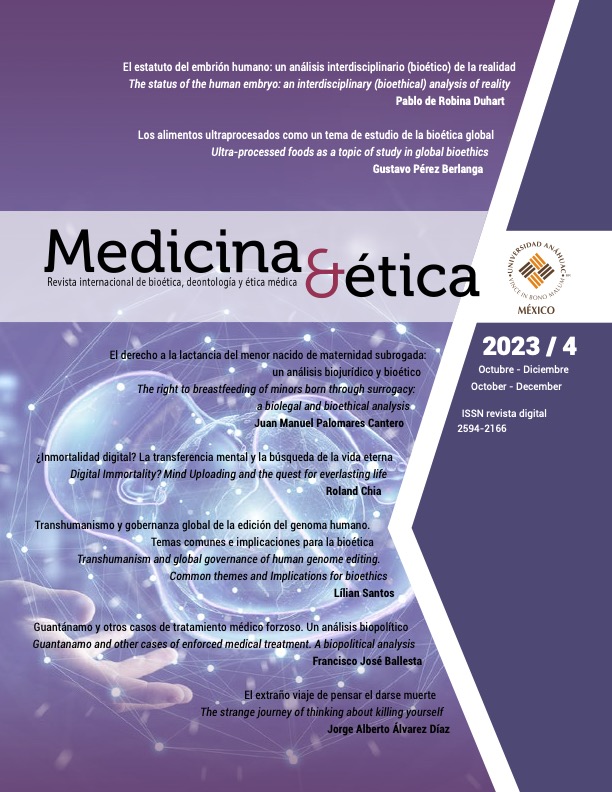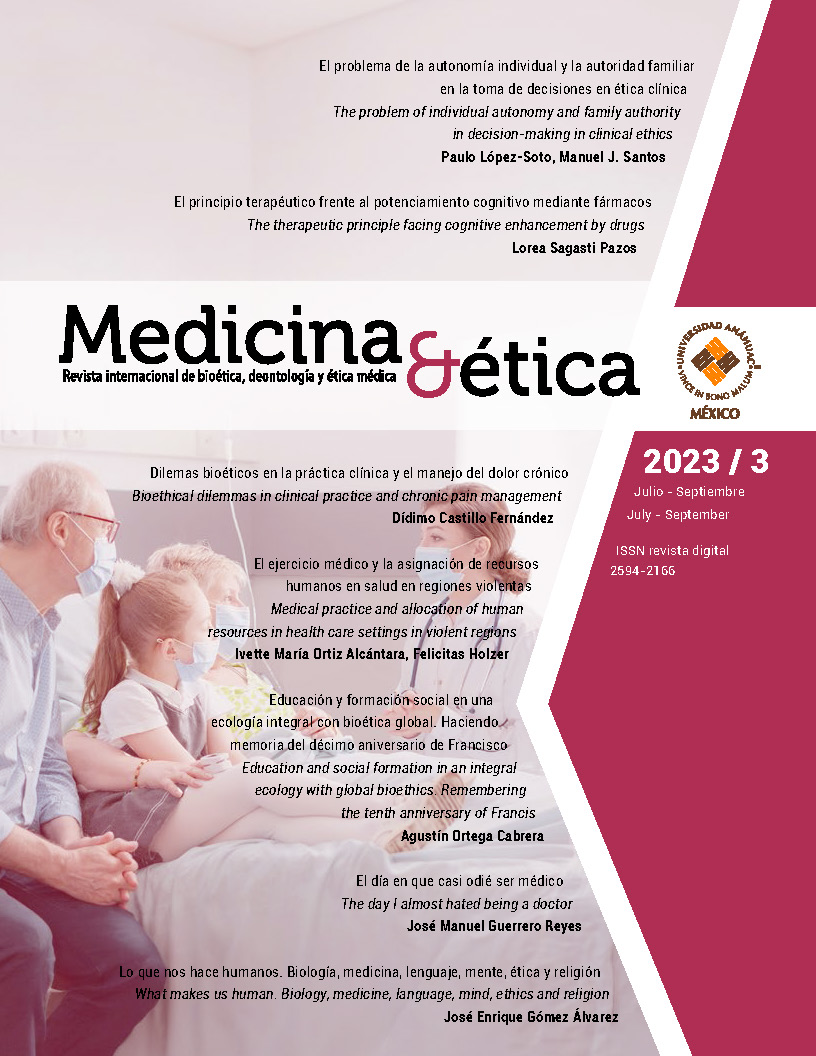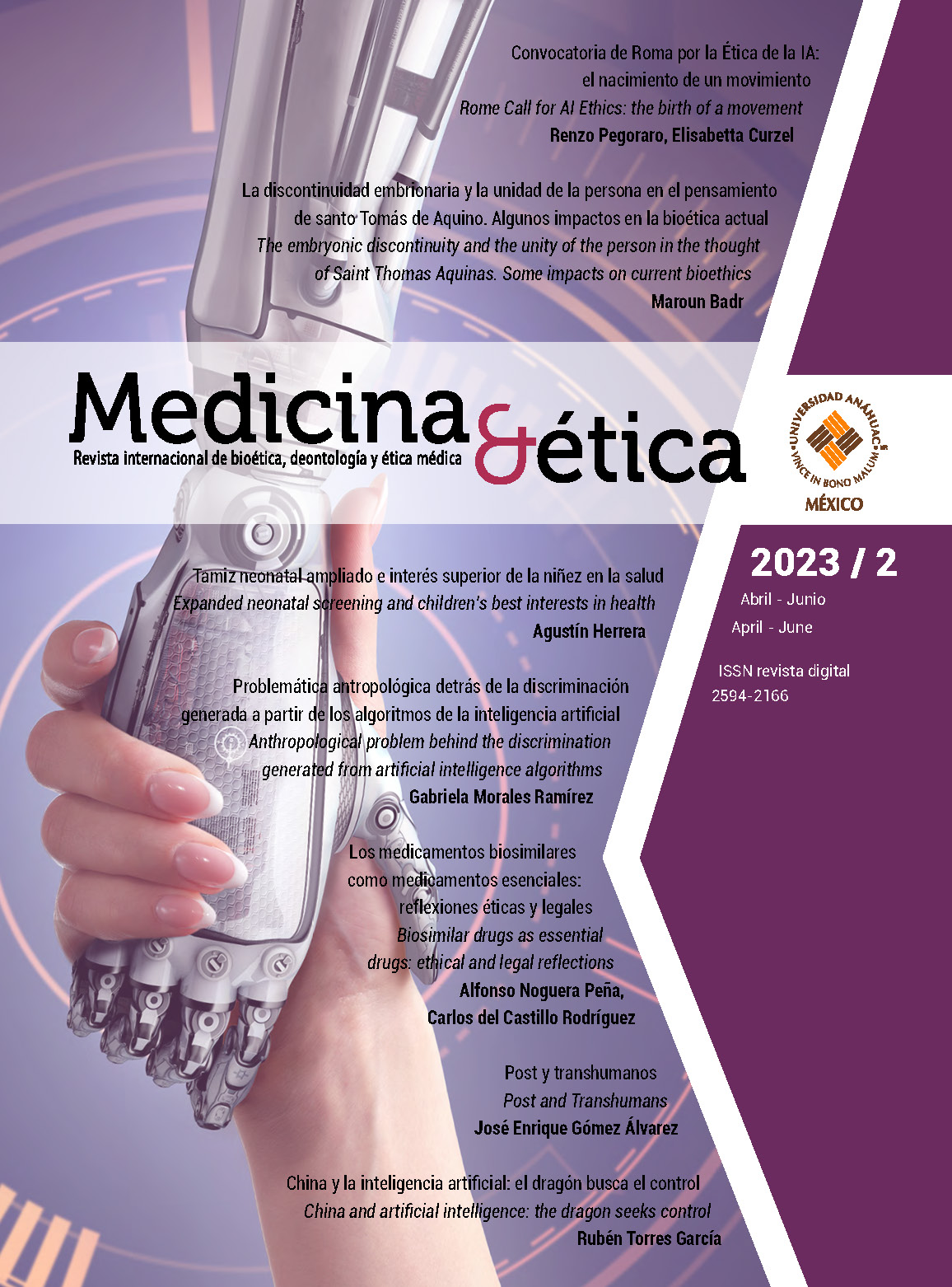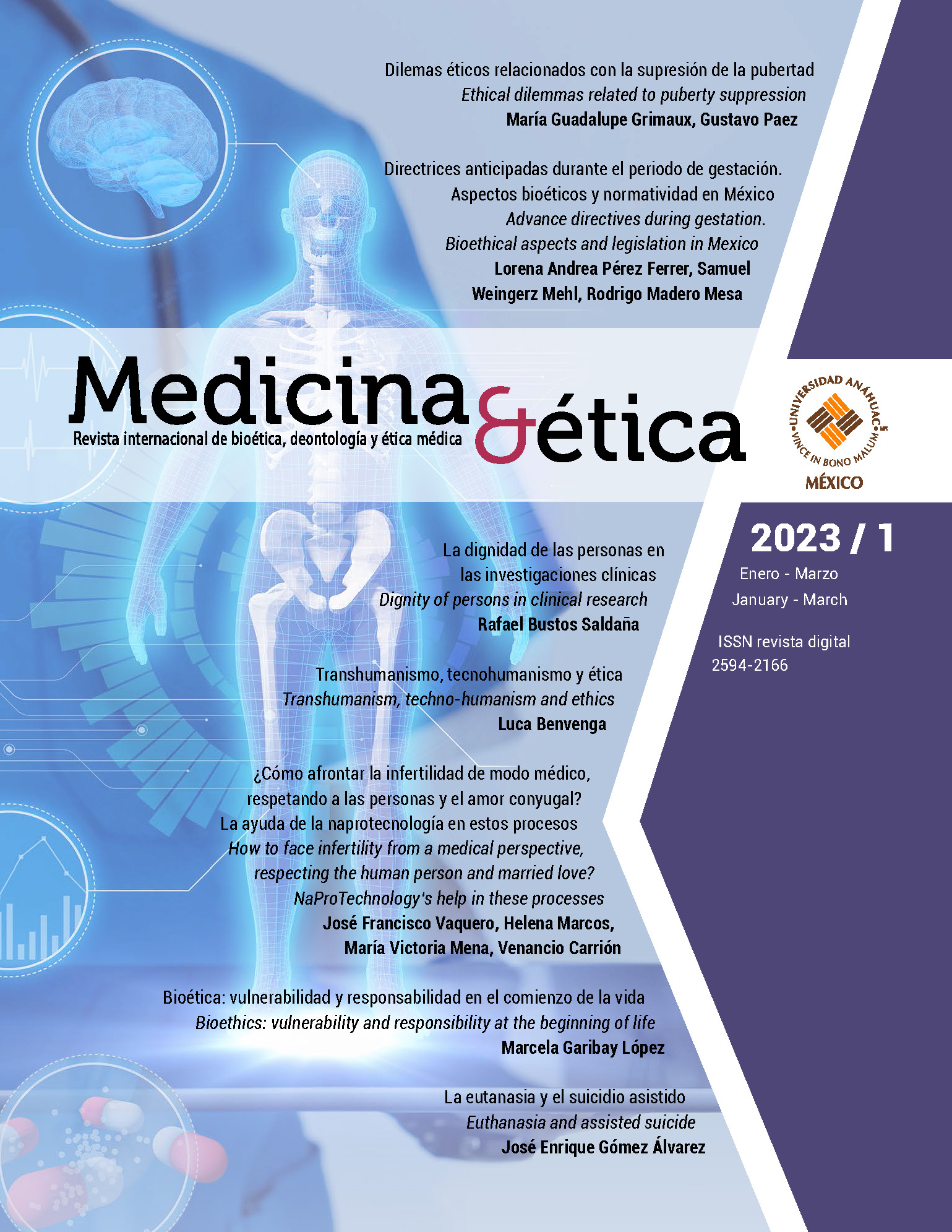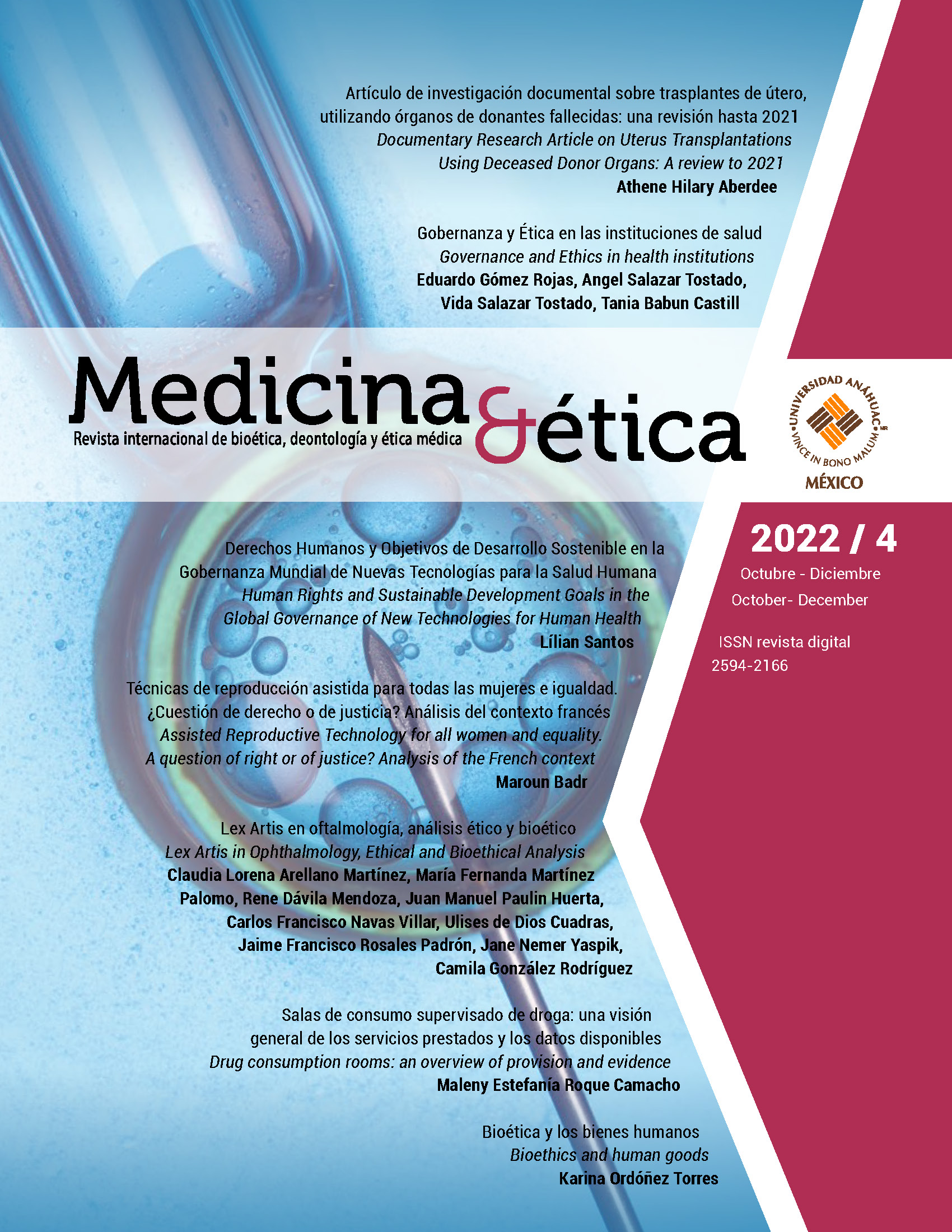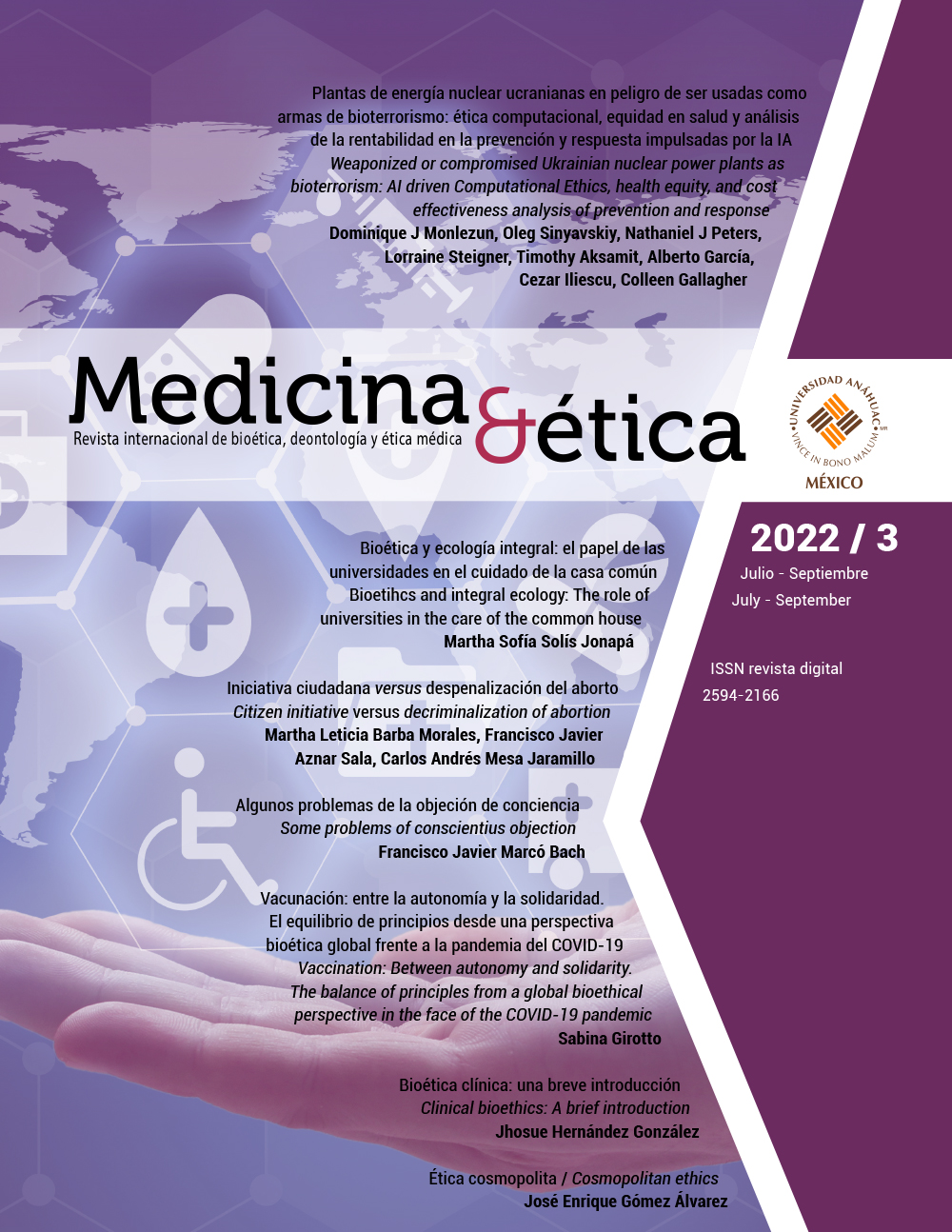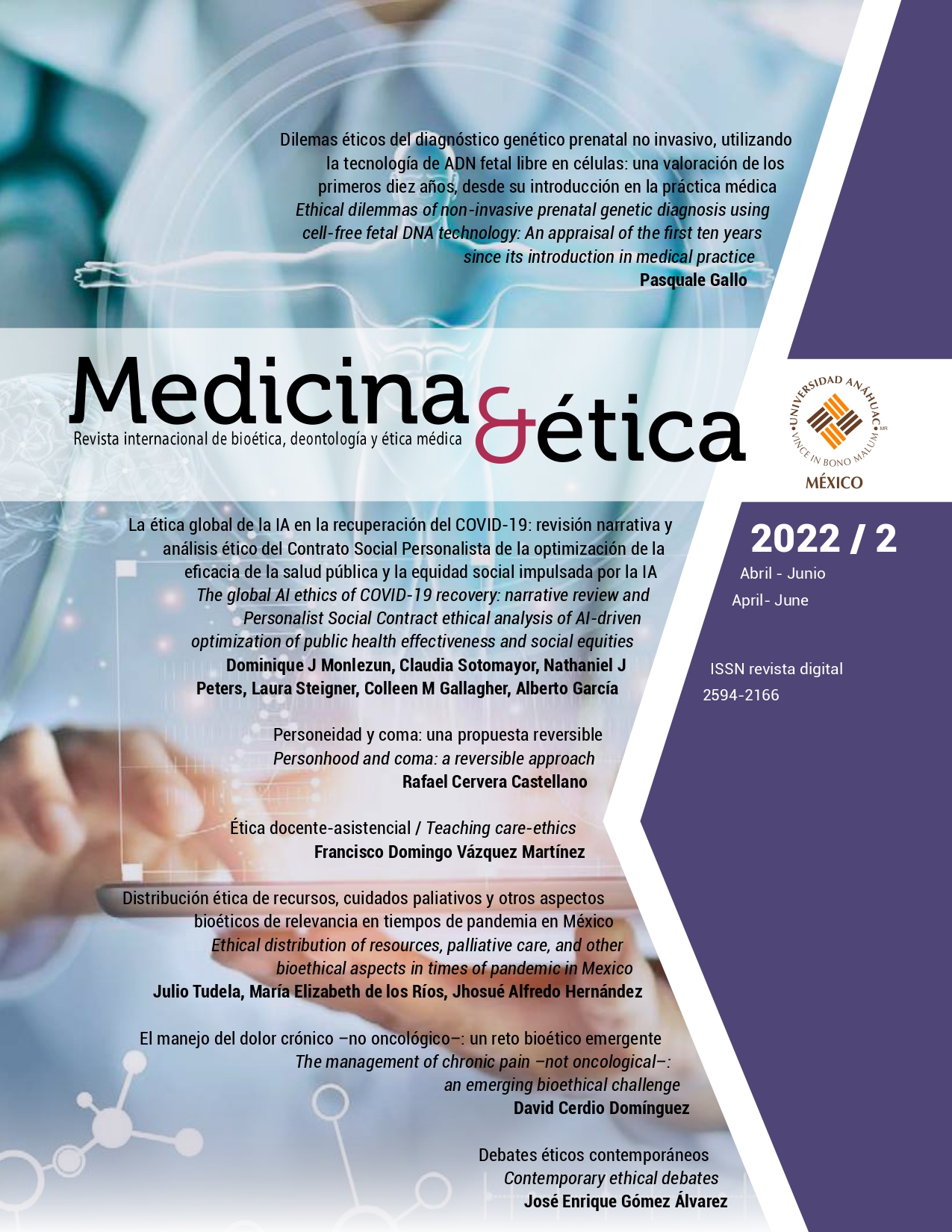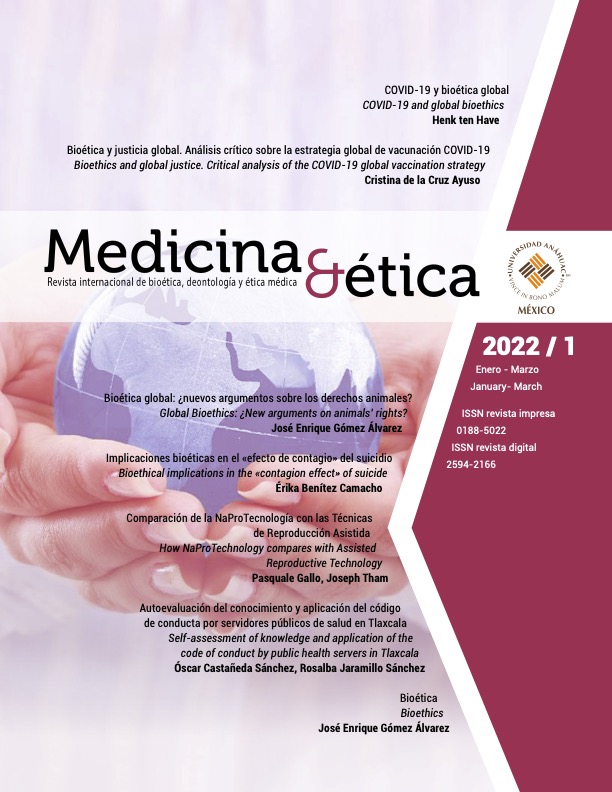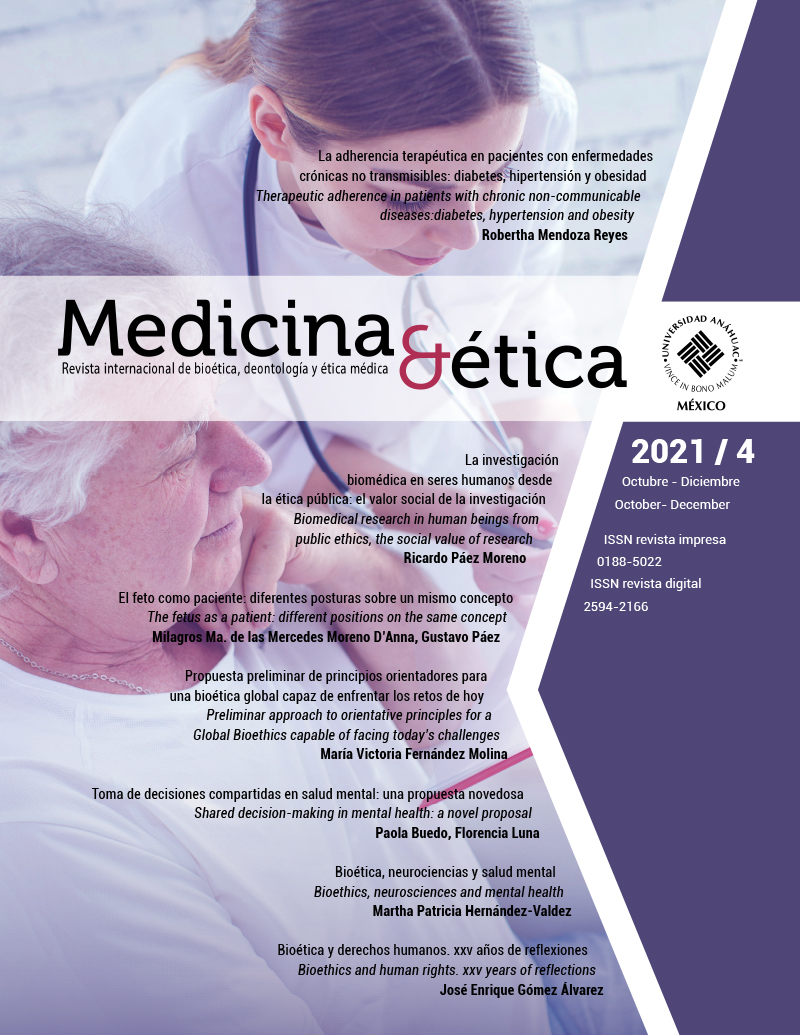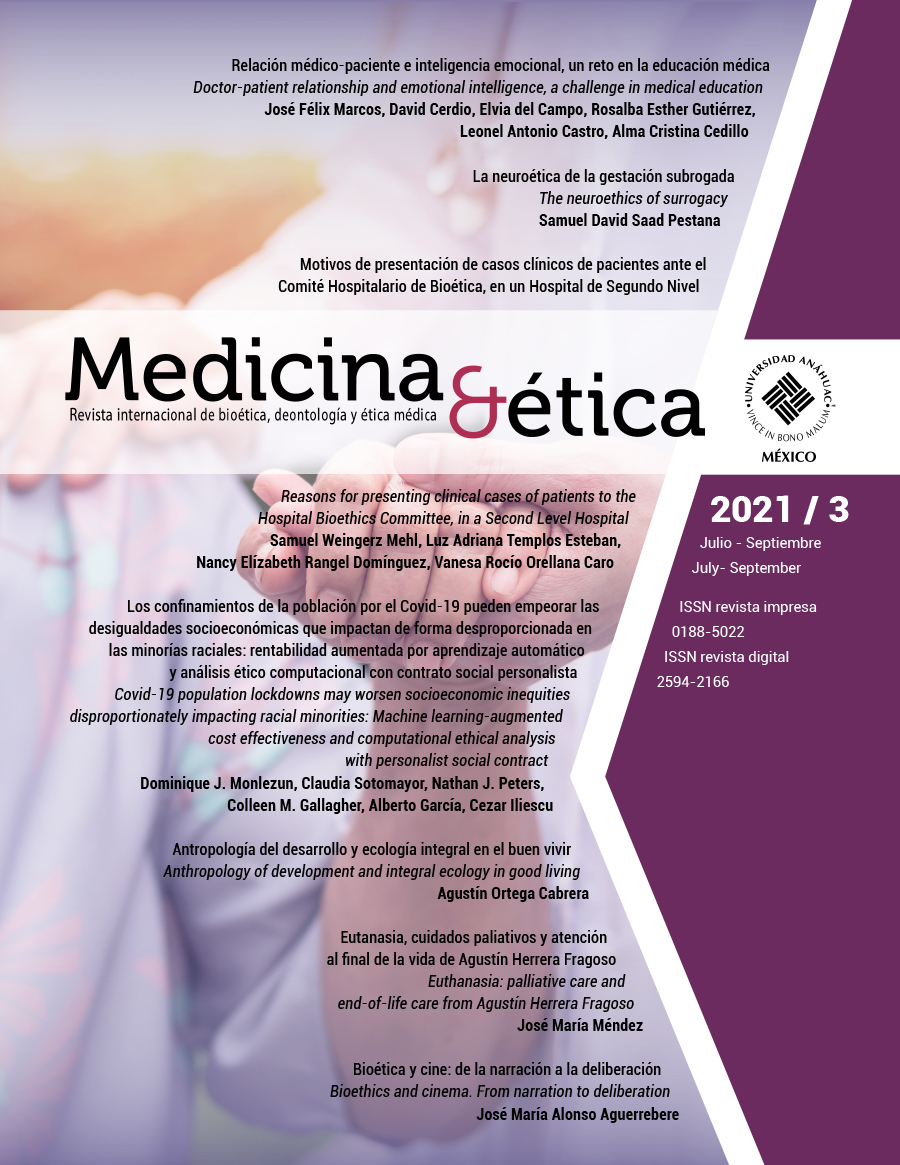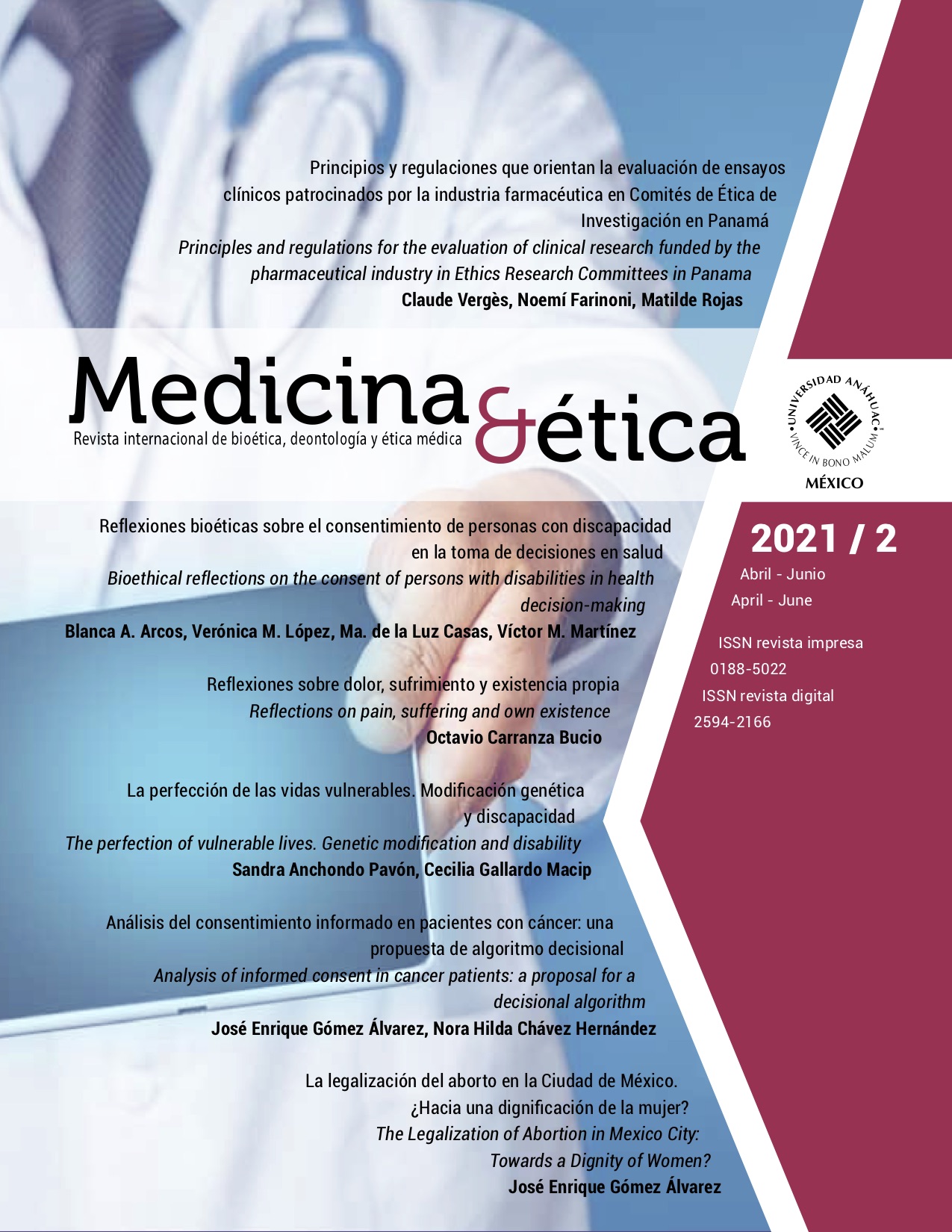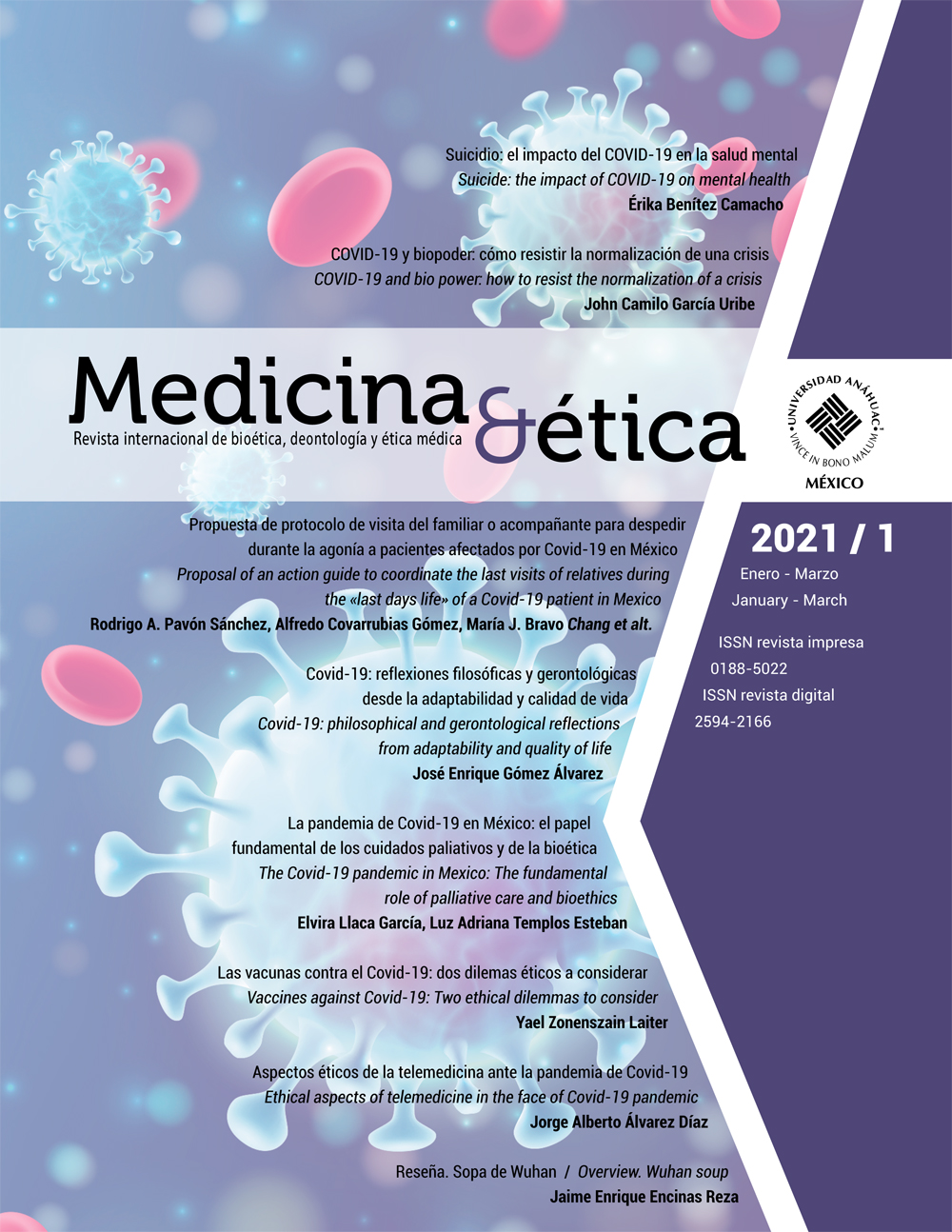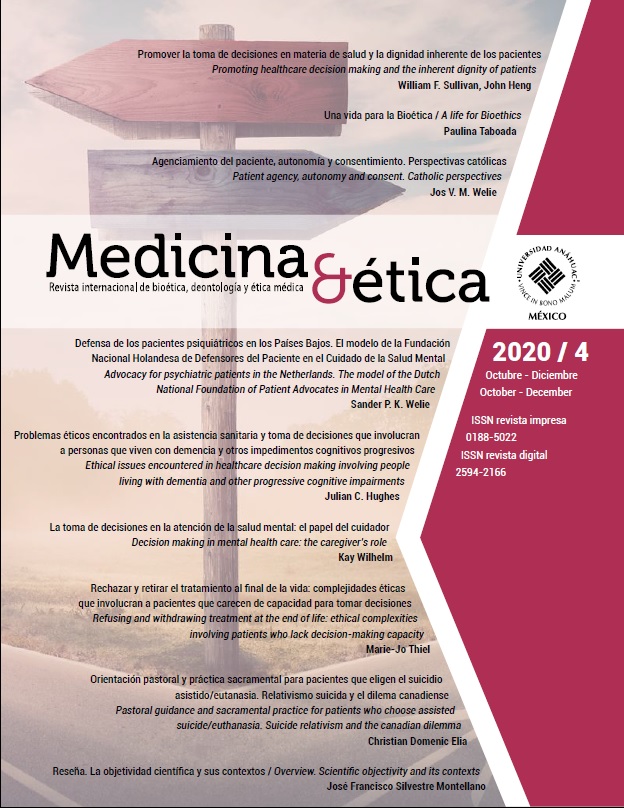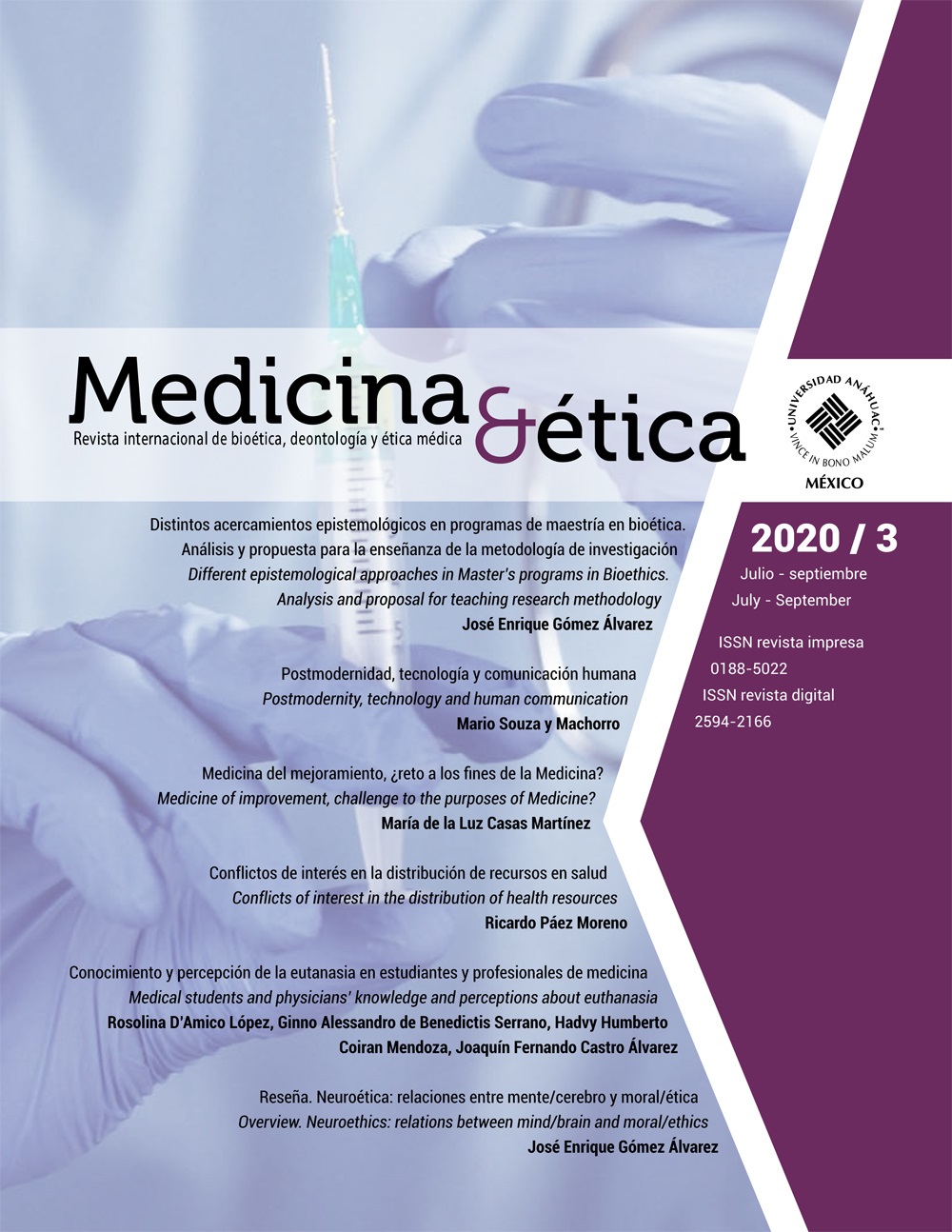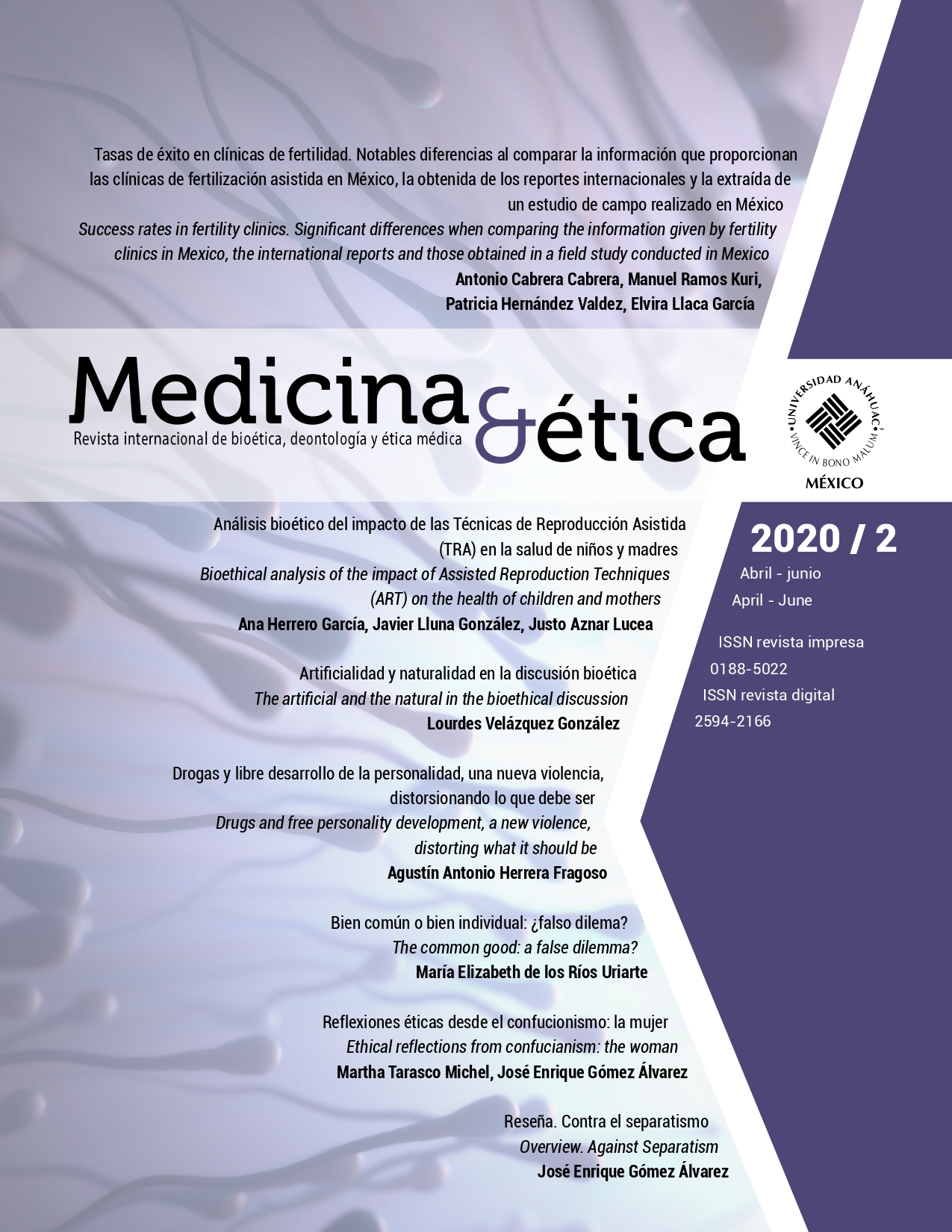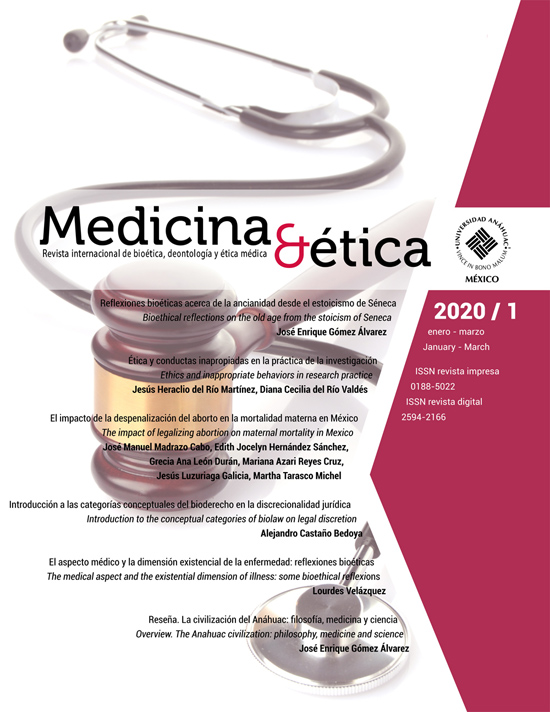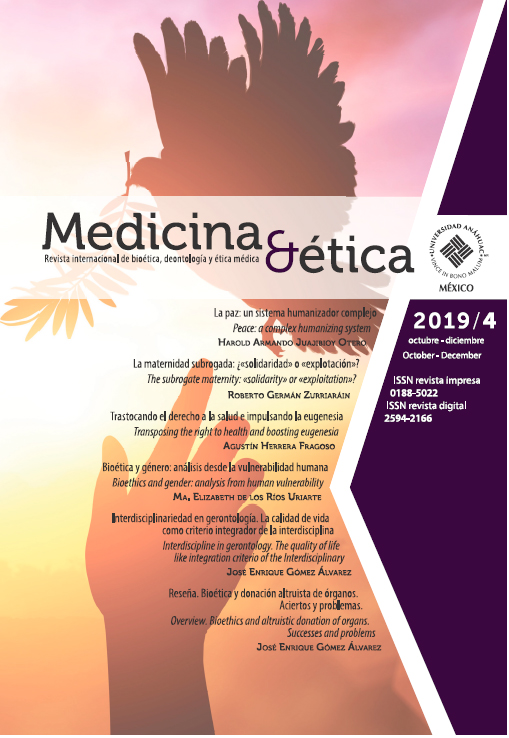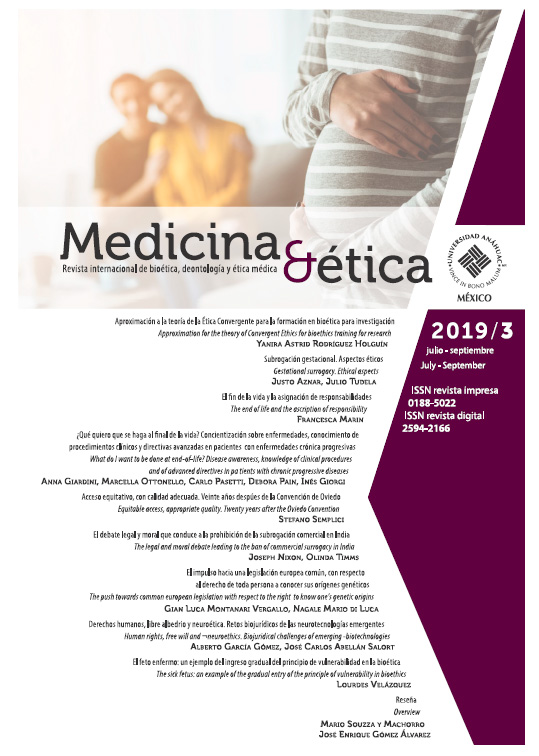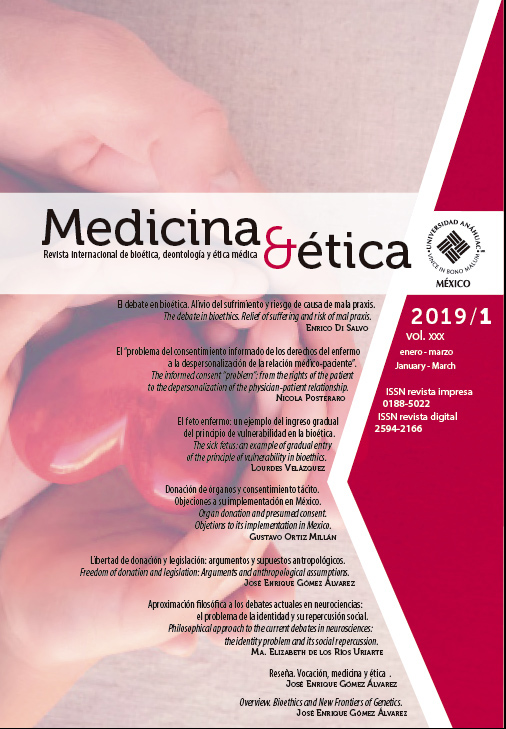Vol. 36 Núm. 1 (2025): Medicina y Ética
Vol. 36 No. 1 (2025)
Vol. 36 Núm. 1 (2025): Medicina y Ética
Vol. 35 Núm. 4 (2024): Medicina y Ética
Vol. 35 No. 4 (2024)
Editorial
P. 949
Introduction
P. 954
Artículos
El derecho a conocer los orígenes biológicos del niño(a) concebido por TRHA: reflexiones desde la situación del anonimato del donante
P. 959
The right to know the biological origins of the child conceived by AHRT: reflections from the situation of current donor anonymity
P. 975
De la interoperabilidad de datos a la “interoperabilidad moral” en la arquitectura mundial de datos sanitarios: caso de uso integrado de análisis ético computacional impulsado por IA con puntuación de propensión bayesiana y análisis de costos y beneficios que optimizan la eficiencia y la equidad en el cáncer colorrectal
P. 990
From data interoperability to ‘moral interoperability’ in the global health data architecture: integrated use case of AI-driven computational ethical analysis with Bayesian-propensity score and cost-benefit analyses optimizing efficiency and equity in colorectal cancer
P. 1024
Los dilemas bioéticos de la legalización de la ‘ayuda activa a morir’ en Francia
P. 1055
The bioethical dilemmas of legalizing ‘active aid in dying’ in France
P. 1077
Cuidados paliativos perinatales: un abordaje integral
P. 1098
Perinatal palliative care: a comprehensive approach
P. 1118
Reflexiones éticas del impacto y desafíos de la inteligencia artificial en la medicina de laboratorio
P. 1137
Ethical reflections on the impact and challenges of artificial intelligence in laboratory medicine
P. 1166
Voluntades anticipadas, revisión histórica, legislación y perspectivas en la relación clínica
P. 1194
Advance Directives, Historical Review, Legislation and Perspectives on the Clinical Relationship
P. 1229
Originalidad doctrinal Humanae vitae
P. 1262
Doctrinal Originality Humanae vitae
P. 1287
Medicina y Ética
Vol. 35 No. 3 (2024)
Editorial
P. 595
Introduction
P. 599
Artículos:
La historia de Maya Kowalski: no hacer el mal
P. 603
Maya Kowalski’s Story: do no harm
P. 622
El Comité de Bioética de España (CBE)
P. 640
The Spanish National Bioethics Committee (CBE)
P. 677
Valoración bioética de la vasectomía sin hijos: autonomía personal frente a maleficencia
P. 713
Bioethical assessment of vasectomy without children: personal autonomy against maleficence
P. 746
La planificación familiar como solución al cambio climático. Dilemas bioéticos en el contexto del Desarrollo Sostenible
P. 777
Family planning as a solution for climate change. Bioethical dilemmas in the context of Sustainable Development
P. 815
Afrontar los retos éticos del consentimiento informado para la donación de tejido cerebral
P. 851
Addressing the Ethical Challenges to Informed Consent for Brain Tissue Donation
P. 875
Reseñas:
Beato Niels Stensen, científico, católico converso y obispo del siglo XVII
P. 896
Blessed Niels Stensen, scientist, Catholic convert and bishop of the seventeenth century
P. 900
Los cuidados paliativos como derecho humano
P. 904
Palliative care as a human right
P. 910
Medicina y Ética
Vol. 35 No. 2 (2024)
Introduction, p. 285
Articles:
The path from environmental ethics to human ecology, p. 309
Analysis about the applicability of medical oaths from the perspective of personalist bioethics with an ontological foundation, p. 351
Bioethical challenges of public policies in the face of population aging in Latin America, p. 402
Political authority and biopower. Personalist approach to common themes between the Compendium of the Social Doctrine of the Church (No. 377-427) and the French Constitution, p. 457
Institutional development of bioethics in Ibero-America: preliminary results of the Ibero-American Bioethics Atlas, p. 511
Reviews:
The bridge between bioethics and medical practice: medical professionalism, p. 544
Analysis of gender dysphoria in the pediatric setting, p. 557
Medicina y Ética
Vol. 35 No. 1 (2024)
Introduction............................................................. 5
Articles:
Experience of dialogue between adults and young university students on gender issues ................. 35
Marta Rodríguez Díaz, Lílian Santos
Transhumanism and improving quality of life in the elderly:
How could it shape the future of pain and suffering in the elderly? ................................85
Francis Jude Selvaraj
Medical education and human rights in the medical units of Mexico:
towards a new ethical horizon ....................................................................140
Francisco Domingo Vázquez Martínez, María de Lourdes Mota Morales,
Vianey Guadalupe Argüelles-Nava
Spirituality and old age: community as an integrating factor .......................189
José Enrique Gómez Álvarez
Palliative care: an anthropological and bioethical reflection ........................219
Jimena Mónica Muñoz Merino, Silvia Becerra Castro
Reviews
Euthanasia and the end of life. A critical reflection ....................................................235
José Enrique Gómez Álvarez
The slogan of care, medicine, and philosophy .....................................................................244
Francisco José Ballesta
Medicina y Ética
Vol. 34 No. 4 (2023)
Content
Editorial, p. 887
Articles:
The status of the human embryo: an interdisciplinary (bioethical) analysis of reality, p. 915
Ultra-processed foods as a topic of study in global bioethics, p. 968
The right to breastfeeding of minors born through surrogacy: a biolegal and bioethical analysis, p. 1018
Digital Immortality? Mind Uploading and the quest for everlasting life, p. 1063
Transhumanism and global governance of human genome editing. Common themes and Implications for bioethics, p. 1127
Reviews:
Guantanamo and other cases of enforced medical treatment. A biopolitical analysis, p. 1167
The strange journey of thinking about killing yourself, p. 1178
Medicina y Ética
Vol. 34 No. 3 (2023)
Content
Editorial, p. 577
Articles:
The problem of individual autonomy and family authority in decision-making in clinical ethics, p. 617
The therapeutic principle facing cognitive enhancement by drugs, p. 685
Bioethical dilemmas in clinical practice and chronic pain management, p. 742
Medical practice and allocation of human resources in health care settings in violent regions, p. 784
Education and social formation in an integral ecology with global bioethics. Remembering the tenth anniversary of Francis, p. 820
Reviews:
The day I almost hated being a doctor, p. 839
What makes us human. Biology, medicine, language, mind, ethics and religion, p. 849
Medicina y Ética
Vol. 34 No. 2 (2023)
Content
Editorial, p. 305
Introduction, p. 310
Articles:
Rome Call for AI Ethics: the birth of a movement, p. 333
The embryonic discontinuity and the unity of the person in the thought of Saint Thomas Aquinas. Some impacts on current bioethics, p. 367
Expanded neonatal screening and children’s best interests in health, p. 407
Anthropological problem behind the discrimination generated from artificial intelligence algorithms, p. 456
Biosimilar drugs as essential drugs: ethical and legal reflections, p. 502
Reviews:
Post and Transhumans, p. 526
China and artificial intelligence: the dragon seeks control, p. 538
Medicina y Ética
Vol. 34 No. 1 (2023)
Content
Introduction, 12
Articles:
Ethical dilemmas related to puberty suppression, p. 33
Advance directives during gestation. Bioethical aspects and legislation in Mexico, p. 87
Dignity of persons in clinical research, p. 142
Transhumanism, techno-humanism and ethics, 177
How to face infertility from a medical perspective, respecting the human person and married love? NaProTechnology´s help in these processes, p. 219
Review:
Bioethics: vulnerability and responsibility at the beginning of life, p. 246
Euthanasia and assisted suicide, p. 259
Medicina y Ética
Vol. 33 No. 4 (2022)
Content
Introduction: María Elizabeth de los Ríos Uriarte, pp. 12
Articles
Ethical dilemmas related to puberty suppression: María Guadalupe Grimaux, Gustavo Paez, pp. 33
Advance directives during gestation. Bioethical aspects and legislation in Mexico: Lorena Andrea Pérez Ferrer, Samuel Weingerz Mehl, Rodrigo Madero Mesa, pp. 87
Dignity of persons in clinical research: Rafael Bustos Saldaña, pp. 142
Transhumanism, techno-humanism and ethics: Luca Benvenga, pp. 177
How to face infertility from a medical perspective, respecting the human person and married love? NaProTechnology‘s help in these processes: José Francisco Vaquero, Helena Marcos, María Victoria Mena, Venancio Carrión, pp. 219
Reviews
Bioethics: vulnerability and responsibility at the beginning of life, Marcela Garibay López, pp. 246
Euthanasia and assisted suicide: José Enrique Gómez Álvarez, pp. 259
Medicina y Ética
Vol. 33 No. 3 (2022)
Content
Introduction, pp. 601-606
Articles
Weaponized or compromised Ukrainian nuclear power plants as bioterrorism: AI driven Computational Ethics, health equity, and cost effectiveness analysis of prevention and response, pp. 639-666
Bioetihcs and integral ecology: The role of universities in the care of the common house, pp. 685-700
Citizen initiative versus decriminalization of abortion, pp. 737-770
Some problems of conscientious objection, pp. 805-836
Vaccination: Between autonomy and solidarity. The balance of principles from a global bioethical perspective in the face of the COVID-19 pandemic, pp. 861-882
Reviews
Clinical bioethics: A brief introduction, pp. 889-894
Cosmopolitan ethics, pp. 905-914
Medicina y Ética
Vol. 33 No. 2 (2022)
Introduction: pp. 317-322
Articles:
Ethical dilemmas of non-invasive prenatal genetic diagnosis using cell-free fetal DNA technology: An appraisal of the first ten years since its introduction in medical practice, pp. 341-356
The global AI ethics of COVID-19 recovery: narrative review and Personalist Social Contract ethical analysis of AI-driven optimization of public health effectiveness and social equities, pp. 377-394
Personhood and coma: a reversible approach, pp. 419-440
Teaching care-ethics, pp. 457-472
Ethical distribution of resources, palliative care, and other bioethical aspects in times of pandemic in Mexico, pp. 489-504
The management of chronic pain –not oncological–: an emerging bioethical challenge, pp. 527-546
Review:
Contemporary ethical debates, pp. 555-561
Medicina y Ética
Vol. 33 No. 1 (2022)
Content
Introduction, p. 13
Articles:
COVID-19 and global bioethics, p. 53
Bioethics and global justice. Critical analysis of the COVID-19 global vaccination strategy, p. 105
Global Bioethics: ¿New arguments on animals’ rights?, p. 143
Bioethical implications in the «contagion effect» of suicide, p. 185
How NaProTechnology compares with Assisted Reproductive Technology, p. 223
Self-assessment of knowledge and application of the code of conduct by public health servers in Tlaxcala, p. 253
Review:
Bioethics, p. 273
Medicina y Ética
Vol. 32 No. 4 (2021)
Content
Introduction: pp. 881-889
Articles
Therapeutic adherence in patients with chronic non-communicable diseases: diabetes, hypertension and obesity, pp. 897-923
Biomedical research in human beings from public ethics: the social value of research, pp. 947-969
The fetus as a patient: different positions on the same concept, pp. 989-1009
Preliminary proposal of guiding principles for a global bioethics capable of facing today's challenges, pp. 1029-1059
Shared Decision Making in Mental Health: A Novel Proposal, pp. 1087-1111
Reviews
Bioethics, neurosciences and mental health, pp. 1135-1139
Bioethics and human rights. xxv years of reflections, pp. 1143-1149
Medicina y Ética
Vol. 32 No. 3 (2021)
Content
Introduction: p. 629
Articles
Doctor-patient relationship and emotional intelligence, a challenge in medical education, p. 651
The neuroethics of surrogacy, p. 685
Reasons for presenting clinical cases of patients to the Hospital Bioethics Committee, in a Second Level Hospital, p. 731
Covid-19 population lockdowns may worsen socioeconomic inequities disproportionately impacting racial minorities: Machine learning-augmented cost effectiveness and computational ethical analysis with personalist social contract, p. 781
Anthropology of development and integral ecology in good living, p. 821
Overview
Bioethics and cinema. From narration to deliberation, p. 845
Medicina y Ética
Vol. 32 No. 2 (2021)
Content
Introduction: p. 337
Articles
Principles and regulations for the evaluation of clinical research funded by the pharmaceutical industry in Ethics Research Committees in Panama: p. 375
Bioethical reflections on the consent of persons with disabilities in health decision-making: p. 425
Reflections on pain, suffering and own existence: p. 463
The perfection of vulnerable lives. Genetic modification and disability: p. 519
Analysis of informed consent in cancer patients: a proposal for a decisional algorithm: p. 569
Overview
The Legalization of Abortion in Mexico City: Towards a Dignity of Women?: p. 587
Medicina & Ética
Vol. 32 No. 1 (2021)
Content
Introduction: p. 11
Articles
Suicide: the impact of Covid-19 on mental health: p. 41
Covid-19 and biopower: How to resist the normalization of crisis: p. 87
Proposal of an action guide to coordinate the last visits of relatives during the «last days life» of a Covid-19 patient in Mexico: p. 123
Covid-19: philosophical and gerontological reflections from adaptability and quality of life: p. 159
The Covid-19 pandemic in Mexico: The fundamental role of palliative care and bioethics: p. 197
Vaccines against Covid-19: Two ethical dilemmas to consider: p. 233
Ethical aspects of telemedicine in the face of Covid-19 pandemic: p. 271
Overview
Wuhan soup: p. 297
Medicina y Ética
Vol. 31 No. 4 (2020)
The year that we have just finished has been very difficult because of the pandemic and the confinement. For that reason, we have prepared a very special issue, which wants to celebrate first, the multiple teachings that we have acquired. Nevertheless, it is a different issue, because as you will read in the Introduction, it is about
the ethical dilemma of mental disability. These articles were written after a colloquium on this topic, held by the International Association of Catholic Bioethics (IACB) in Ottawa in June 2019.The Academic Director, Dr. William Sullivan, requested our Magazine to be able to publish the articles, which after fulfilling the requirements for peer review, could be seen together in one issue of the Journal.
Medicina y Ética
Vol. 31 No. 3 (2020)
While the edition of this issue is being prepared, the first anniversary
of the death of Professor Elio Sgreccia is commemorated,
which occurred on June 5, 2019. He was the greatest exponent of
ontological personalism, applied to Bioethics, and he was the founder
of the Institute and the Bioethics Center of the University of
the Sacro Cuore in Rome, in 1984. The Medicina e Morale magazine
also founded by him depends from the above-mentioned institutions,
and to which for several years our own magazine was
linked, through an agreement to publish and translate the articles
of the Italian magazine into Spanish. Currently, both magazines
are independent, and the Mexican one has been going out uninterruptedly
four times per year, for thirty years.
Elio Sgreccia has managed to create a school of thought, not
only through the formal teaching of the Institute, as well as its
countless publications and communications on social media, but
also due to the multiple dissemination activities, and the time he
worked in the Pontifical Academy of Life before and during his
presidency.
Medicina & Etica
Vol. 31 No. 2 (2020)
Issue number 2 of our magazine makes an emphasis on... articles on assisted reproduction techniques. The first one by Cabrera A. et al, points out through a very extensive study, which had been carried out in various Reproduction Biology Clinics in Mexico City, jointly with the international reports of the Latin American Network of Assisted Reproduction (RED LARA), that of the European Society of Human Reproduction and Embryology (ESHRE).
The second article on this topic: «Bioethical analysis of the impact of Assisted Reproduction Techniques (ART) on the health of children and mothers», is an invitation to think about the consequences of the techniques. Those techniques which since 1993 (vol 4, Num 2, pp. 47-66 by Dr. Marcó Bach), that we had already published, but that in this article, we add more data about the impact on the mother and the child.
The third article, which without being focused on assisted reproduction, is directly linked in a philosophical reflection on the artificiality presented by Velázquez L., and which focuses on the adaptation of artificiality to the ontological nature of the person. It addresses about the tension of ethicity between what is natural and what is artificial.
Another interesting article is the analysis of the decriminalization of some drugs, such as the misrepresentation of good, for the sake of autonomy, and even the call for their use, such as the development of personality. Herrera Fragoso, considers this fact as a type of violence. This violence, is assumed to destroy Bioethics, bio jury and that «laws lose their nature of being for the benefit and human development», since they must be inspired by universal values that protect the human being.
Being the universal Good, and that does not exclude the Good of anybody else, the article presented by De los Ríos, about the Common Good, justly speaks about reductionism, and the lack of understanding, of what is Good, if society is excluded, to only include the individual Good, which I consider, a welfare.
Finally, an article on Bioethics and Religions, this time on Confucianism and women. In classical Confucianism, women had a very important social role, but always subject to men (father, husband, son, brother) and by age (mother, mother-in-law).
Medicina y Ética
Vol. 31 No. 1 (2020)
In this issue of Medicine and Ethics, various topics are addressed: research ethics, old age and stoicism, abortion, bio-law, medical and existential aspects of the bio-right, and the meaning of the disease.
The first article, «Bioethical reflections on old age from the stoicism of Seneca», by José Enrique Gómez Álvarez, addresses the ethical implications of the conception of old age in the stoicism of Seneca.
The second article, «Ethics and inappropriate behavior in research practice», by Jesús del Río Martínez and Diana del Río Valdés, analyze ethical aspects in the research process, or as they point out, the research system.
In «The Impact on the Decriminalization of Abortion in Maternal Mortality in Mexico», Madrazo et al. demonstrate that the decriminalization of abortion in 2007 in Mexico City, which among one of its justifications was to seek the reduction of maternal deaths caused by clandestine abortions, but the authors point out that he has not fulfilled that assumption.
In «Introduction to the conceptual categories of bio-law in legal discretion», by Alejandro Castaño Bedoya, the ontological and anthropological assumptions of various arguments in the law applied to bioethics are analyzed, such as physicalism or interactionist dualist theories.
Lourdes Velázquez, in «The medical aspect and the existential dimension of the disease: bioethical reflections», emphasizes the need to deepen the existential aspect of the disease as a part of the way of being and living of the human being.
The number closes with the review of the book «The Civilization of Anahuac: philosophy, medicine and science», by de José Enrique Gómez Álvarez.
Medicina y Ética Vol. XXX, Núm. 4
Vol. 30 No. 4 (2019)
Este número del final del año contiene artículos con enfoques múltiples y novedosos. Encabeza esta entrega el artículo sobre la paz, como sistema humanizador complejo, del Dr. Juajilbio y Otero, que aporta un estudio con una impecable metodología interdisciplinar.
Germán Zurriarán, de la Universidad de la Rioja, España, analiza los polos de la maternidad subrogada como un acto solidario y lo contrapone a la explotación de la mujer, y del hijo.
El análisis que elabora el Dr. Herrera Fragoso sobre una resolución jurídica que se encuentra en revisión, la cual impulsa a la eugenesia, se trata de un claro ejemplo de la metodología que emplea la biojurídica, esta rama de la bioética que tiene tan importante desarrollo e importancia.
La Dra. de los Ríos aborda el tema del género desde el enfoque de la vulnerabilidad, que si bien se maneja en la agenda pública, en la literatura ética no es habitual hablar de este aspecto sin victimizar a la persona. Y por último, este número concluye con un artículo sobre el cuidado del paciente geriátrico, desde el cuidado gerontológico.
Este artículo del Dr. Gómez Álvarez enfoca la calidad de vida que se busca en el cuidado de cualquier paciente crónico, como la integración de todas las interdisciplinas que forman parte de la gerontología.
Medicina y Ética volume XXX, number 3
Vol. 30 No. 3 (2019)
This number presents, on one hand, an ethical and bioethical approach to surrogate maternity and the question its commercialization raises. On the other hand, it presents topics concerning law where it is proposed the access to systems that allow people to know their genetic origins, the rights derived from the practices of incorporation of technologies into human brain and its implications in freedom. The same way, this number includes other topics as bioethical trainning in the education of bioethicists towards research and reflections in the end of life.
Medicina y Ética volume XXX, number 2
Vol. 30 No. 2 (2019)
This second issue of the Magazine opens with a great chapter by the National Commissioner of the National Commission Bioethic, Dr. Manuel Ruiz de Chávez, with the collaboration of Gabriela Pineda. In this article, the authors make an analysis about what has happened in Mexico with the Bioethics Hospital Committees, and the Ethics Committees on Research, which boosted and sustained in the different places of the country by the State Commissions on Bioethics, given their relationship with the medical, academic, research, and civil society groups sectors. Besides, it points out the requirements that can improve their operation.
Medicina y Ética volume XXX, number 1
Vol. 30 No. 1 (2019)
In this new year of 2019, the Medicine and Ethics magazine turns three years of its on line setting, offering to our viewers its reading from the Open Journal System platform, which is friendly, and makes clear its processes. Besides, we have improved the requirements for authors and the ethical standards of the same. Our new year’s resolution, is to increase the variety of authors, so we will be very honored that our readers feel encouraged to write, and in accordance to the standards above cited, will send their valuable material to us.
The articles which are presented in this issue, have the common source of showing in all of them, how the scientific advances and legislative changes propose new reflections in Bioethics.

